|
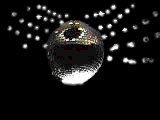 Some people claims the Disco scene started already in the early 70's. Like in '71-'73. But I guess that really
depends on what you think is DISCO?! The Discotheque scene really started back then, with clubs starting playing
music on records to the audience. In these clubs, the Disc-Jockey [the DJ] was formed as this guy putting the records on the
turntables and often talking to the crowd in a radio show kind of way.
Some people claims the Disco scene started already in the early 70's. Like in '71-'73. But I guess that really
depends on what you think is DISCO?! The Discotheque scene really started back then, with clubs starting playing
music on records to the audience. In these clubs, the Disc-Jockey [the DJ] was formed as this guy putting the records on the
turntables and often talking to the crowd in a radio show kind of way.
Other people say the Disco days started in the mid 70's and that's also my opinion. I think that you in tunes from around
'74-'76 can start hearing more of, what I call, "the Disco sound" - than you could just a couple of years before.
One of the first "Disco Hits" was Gloria Gaynor's "Never can say
goodbye", which was on top of the charts already back in 1974.
Most of the first Disco hits from the mid 70's often had a little slower tempo, like some 90-110 bpm [Beats Per Minute]. But
as the years passed by the Disco music became faster [110-140 bpm] and most of all - the songs became longer... Much thanks
to this guy by the name Tom Moulton, who thought the "standard" 3 minute
songs were just too short and he came up with an idea; "There's got to be a way to make it longer where you don't loose
that feeling. Where you can take them to another level.".
He sat in his home and mixed together a tape on which he mixed the same song with itself to make a longer version before
mixing it into another track. That's how he invented the Disco-mix. This break-through made him one of the hottest and
most credited mixers of all times. Everyone wanted him to make "A Tom Moulton Mix" of their songs.
He had a hard time trying to get these longer versions put on vinyl, the problem was that the 7" single couldn't hold more
than some maximum 4-5 minutes with good quality. That's why he often was made to make 2 versions of the song - an album
version, the full-length version, and a single version with the best parts of the long version. But he really wanted
people to get to hear the longer version, especially on the dancefloors, so Tom and his mastering guy, Josť Rodriguez,
pressed one single on 10" instead of 7". The next "single" they choose to cut on 12", same format as an album, this was how
they come to invent the 12" single - which fast became all DJ's tool and format.
But the inventor of the 12" single and the Disco Mix, Tom Moulton, says this about his own work; "I didn't make a dance
record, I made a record you could dance TO".
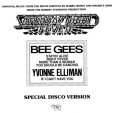 With the new format and the huge Disco explosion, special and exclusive mix versions were released on 12" DJ promotion
copies only. One of the most sought for (and hard to find) 12" promos, is the "Saturday Night Fever" 5-track promo, which
include Yvonne Elliman's "If I can't have you" and 4 Bee Gees tracks; "Stayin' alive", "Night
fever", "More than a woman" and "You should be dancing".
With the new format and the huge Disco explosion, special and exclusive mix versions were released on 12" DJ promotion
copies only. One of the most sought for (and hard to find) 12" promos, is the "Saturday Night Fever" 5-track promo, which
include Yvonne Elliman's "If I can't have you" and 4 Bee Gees tracks; "Stayin' alive", "Night
fever", "More than a woman" and "You should be dancing".
The Yvonne Elliman song isn't available on any other 12", nor is the exclusive mix of "Stayin' alive" which is also only
available on this white label promo.
Just as Tom says above; "I made a record you could dance TO", this was the whole idea behind this whole new genre.
The Disco music should be happy and danceable. It was designed for making people move and have fun to, on the dancefloor
and everywhere else. With its driving beats, it almost has a hypnotic feel that makes you wanna dance or at least stomp
your feet to the beat. It's really hard to sit still when you hear a good Disco tune, and you get happy when listening to
Disco.
Not surprisingly, many Disco songs lyrics are about dancing; "Dance, dance, dance" & "Everybody Dance"
(Chic), "Come on Dance, Dance" (Saturday Night Band), "Dance
across the floor" (Jimmy "Bo" Horne) and "Dance yourself dizzy" (Liquid Gold).
The lyrics are mostly happy and about dancing, loving and having a good time, but another important ingredient in this
pre-AIDS time was, of course, SEX!
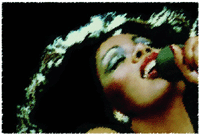 Just listen to the probably most known sexy hit of the era, Donna Summer's
almost 17 minutes long Disco orgy; "Love to love you baby". This was literally like having an orgasm on the dancefloor.
Just listen to the probably most known sexy hit of the era, Donna Summer's
almost 17 minutes long Disco orgy; "Love to love you baby". This was literally like having an orgasm on the dancefloor.
Sexual undertones are also very common in Disco tunes, just look at titles like "Body to body boogie" (O.R.S),
"Keep in touch (Body to body)" (Shades of Love), "Do ya wanna get Funky with me"
(Peter Brown), "Do it to me 'Once more with feeling'" (by James Bond
actress Britt Ekland) among others.
|

The sex appeal of Disco music also found its way to the big screen, if yet in a little different way. For example in the
Dudley Moore movie 10, a Disco version by Thijs Van Leer of the classical Ravel tune "Bolero"
played a central role when our hero are trying to have sex with the sexy Bo Derek.
But it wasn't just in this movie the classical tunes returned in Disco versions. Actually many classical melodies where
"Discofied", both off and on the screen. Both "Night on Disco Mountain" (based on "Night on Bald Mountain") and
"A fifth of Beethoven" (based on Beethoven's Fifth Symphony) were featured in the movie that would break Disco out
of the clubs and into the homes and radio stations all over the world - Saturday Night Fever!
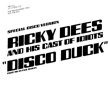 But it wasn't just Disco that inspired movies, Disco was just as much influenced by other media's as they were of Disco.
You'll find Disco tunes based on different cartoon characters, like the Donald Duck voice in Rick Dees'
"Disco Duck", or all the songs released about Superman when that movie hit the silver screen.
But it wasn't just Disco that inspired movies, Disco was just as much influenced by other media's as they were of Disco.
You'll find Disco tunes based on different cartoon characters, like the Donald Duck voice in Rick Dees'
"Disco Duck", or all the songs released about Superman when that movie hit the silver screen.
Other movies that inspired Disco tunes were the Star Wars trilogy, which scored big hits for Meco, who also
made a Disco version of the main theme from the Superman movie.
Legendary writer/producer Kenton Nix also wrote a song inspired
by the Star Wars movies. Kenton, recalls how he wrote Ednah Holt's "Serious, Sirius space party";
"Larry Levan and I were Trekkies and Star Wars freaks. Larry said to me; 'Why don't you write a song about
a party in outer space and talk about the characters like they are at the Garage [the legendary club - the Paradise Garage]
and the Garage is in space and everyone has a membership: you know, Darth, Kirk, Luke, OB1 and everybody.
And they're just rocking, just up there dancing.' So I did it."
The Paradise Garage (as mentioned above) was mainly a gay club, and the gay crowd have always been very fast and open
to pick up new types of music and styles. The same goes for Disco - it first became popular in the gay clubs, before it reached
the broad masses through the Saturday Night Fever movie.
The gay scene also early got it's own icons in the Village People, who with their hit song "Y.M.C.A.", got
people running to YMCA's all over the world. That massive success for the YMCA made the U.S. Navy ask the guys if they
couldn't do a song about the navy, which resulted in the hit "In the Navy". That song made the same impact on
people and the Navy got lots of new recruits.
But one really have to say that the Saturday Night Fever movie was the big break-through for Disco music. From having been
the music for the people in the Clubs, the Discotheques, everything exploded like overnight. The Bee Gees became the
Disco icons and all the music from the soundtrack became hits.
All of a sudden EVERYONE wanted to be a part of the growing Disco scene. Even "unlikely" people/groups like Kiss
("I was made for lovin' you"), Cher ("Take Me Home"), Rod Stewart ("Da Ya Think I'm Sexy?")
and the Rolling Stones ("Miss You") wanted their part of the action.
Actually even Brian Adams' first hit was a Top 5 club hit and Disco smacker called "Let Me Take You Dancing".

The Saturday Night Fever movie also set a "standard" for the look of a clubber. Most of the guys were all Tony Manero
[John Travolta] look-a-likes, in polyester shirts and suits, doing "the Hustle" in their platform shoes.
The ladies where all dressed up in [preferably] designer made dresses and working out the dancefloors in their high heels.
Some of the most popular designers back then can be heard in the classic song - "He's the greatest dancer", in which
the Sister Sledge counts - "Halston, Gucci, Fiorucci".
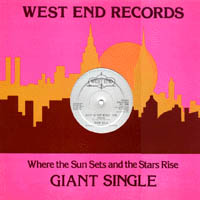 But if Saturday Night Fever was the thing that really got the Disco ball rolling, it was really the labels and the clubs
that had set the ground for it. Because some years before the Bee Gees shouted "O-o-o-oh Stayin' alive, stayin' alive",
labels like WestEnd, Prelude and
SalSoul had ruled the dance scene - specially in New York. These were all small
independent labels, which were fast to pick up the trends and really saw what was coming.
But if Saturday Night Fever was the thing that really got the Disco ball rolling, it was really the labels and the clubs
that had set the ground for it. Because some years before the Bee Gees shouted "O-o-o-oh Stayin' alive, stayin' alive",
labels like WestEnd, Prelude and
SalSoul had ruled the dance scene - specially in New York. These were all small
independent labels, which were fast to pick up the trends and really saw what was coming.
The larger companies didn't really get on the train until the Disco era had already started. But other labels that released
good Disco music were, the Miami based T.K. Disco, and also
Atlantic, Casablanca and
Columbia.
The domination of New York based companies lasted until around 1980 when most of the bigger companies relocated to the
west coast and Los Angeles.
But just as there were so many Disco records released - there were almost as many different labels. Many labels just released
a few records - mainly 12" singles - before they folded. But that's also part of the charm with Disco. You can still today
find "new" great Disco records that you didn't knew of before and labels you had never heard of before. Some of these labels
"Discoholics" like myself keep looking for is P&P, Sound of New York, RSO, BC, De-Lite,
Fantasy and Red Greg.
What's also fascinating about these labels, is that they many times had their own unique sound. So you can often hear on a
tune what label it might have been released on.
It's maybe hard to understand today what an impact Disco music had back during those days. Most hit songs fast became
worldwide hits and no matter where you were - people could still sing "Good times", "Upside down" or any of
the other hits that ruled the charts either in New York or Hong Kong.
One fascinating thing was when the group Lipps Inc. released their "Funkytown"... Then there were thousand and
thousands towns all over the world that got another sign saying Funkytown as well as its "real" town name.
The Disco era was also (unfairly) known for "One hit wonders"... And Lipps Inc. could be one of them, but with the right
song unknown people or groups could get a huge worldwide hit, but then they were never heard from again. But actually I
think the music business always has been working like this, so this was nothing special for the Disco scene. It's just the
same now with artists/groups having a worldwide smash and then never gets heard of again. But we all should keep in mind
that it is very hard to write a hit...
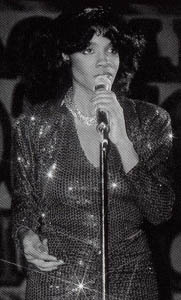 Some of the so called "One hit wonders" of the Disco era was; Patrick Hernandez with his "Born to be alive",
Penny McLean's "Lady bump", "I love the nightlife" by Alicia Bridges, "Can't live without
your love" by Tamiko Jones, Melba Moore's "This is it", Jacki Moore with her "This time
baby" and Anita Ward's "Ring my bell".
Some of the so called "One hit wonders" of the Disco era was; Patrick Hernandez with his "Born to be alive",
Penny McLean's "Lady bump", "I love the nightlife" by Alicia Bridges, "Can't live without
your love" by Tamiko Jones, Melba Moore's "This is it", Jacki Moore with her "This time
baby" and Anita Ward's "Ring my bell".
I think it's
quite unfair to call some of these "One hit wonders", because some of them really did some great songs after their huge hit,
but this other singles would always be compared to their worldwide smash. Anita Ward did for example release a great dance
track called "Don't drop my love" and Melba Moore sang "You stepped into my life".
When talking about Anita Ward, her song "Ring my bell" was written and produced by a guy named Frederik Knight. He
did one of the first, what I would call, "reply to" songs, when he in 1981 recorded his "Let me ring your bell again"
as a "reply" to his 1979 Anita Ward hit "Ring my bell".
This kind of "reply to" hits boomed in 1983 when Michael Jackson ruled the charts all over with his "Billie Jean".
There were numerous of either replies to or medleys using this song - trying to get their share of the fame. The most known
reply to "Billie Jean" is Lydia Murdock, who in her song "Superstar" claims to be Billie Jean. Other songs
using Michael's song is the ClubHouse and Pink Project medleys; "Do it again" and "B-Project".
Also already back in the late 70's/early 80's the first "sampling" started by the rap artists like for example Grandmaster
Flash and Sugarhill Gang who was scratching and rapping over other peoples records. G.M. Flash was for example
rapping over the legendary WestEnd Records first release, "Sessomatto".
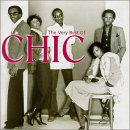 the Sugarhill Gang got the first big worldwide rap hit with their "Rapper's delight", which is based on the instrumental
version of Chic's "Good times". It's told that the first time Nile Rodgers [of Chic] heard "Rapper's
delight" was in a New York club. He first thought it was the DJ who was rapping over his and Bernard Edwards' "Good
times". He thought it was quite cool and went up to the DJ and came to find out that this was actually another group using
"his" song in their record without having got the permission in any way to use the song. See my
Chic page for the rest of this story...
the Sugarhill Gang got the first big worldwide rap hit with their "Rapper's delight", which is based on the instrumental
version of Chic's "Good times". It's told that the first time Nile Rodgers [of Chic] heard "Rapper's
delight" was in a New York club. He first thought it was the DJ who was rapping over his and Bernard Edwards' "Good
times". He thought it was quite cool and went up to the DJ and came to find out that this was actually another group using
"his" song in their record without having got the permission in any way to use the song. See my
Chic page for the rest of this story...
The next thing before sampling was a phenomenon that started during the 80's. At this time many records was released with
accapella [vocals only] versions of the song. DJ's fast found these accapellas very useful, 'cause with the vocals added
on top of other songs they could create their "own" anthem/song. This can actually be very cool, when people dancing to this
popular track and in the break or on top of the instrumental you add another popular vocal. If this is done in a professional
way the effect on the dancefloor is just like - WOW!
So I guess you can say this kind of technique was a kind of sampling before sampling really got in fashion during the late
80's.
|
 |
Download the FREE basic RealPlayer...

CLICK to hear some related songs...
I love the nightlife
Alicia Bridges
Don't drop my love
Anita Ward
Ring my bell
Anita Ward
Night fever
Bee Gees
Stayin' alive
Bee Gees
You should be dancing
Bee Gees
Ride on time
Black Box
Superman
Celi Bee & Buzzy Bunch
Dance dance dance
Chic
Everybody dance"
Chic
Good times
Chic
Upside down
Diana Ross
Love to love you baby
Donna Summer
Serious, Sirius space party
Ednah Holt
Let me ring your bell again
Frederick Knight
Never can say goodbye
Gloria Gaynor
Superman
Herbie Mann
This time baby
Jackie Moore
Dance across the floor
Jimmy "Bo" Horne
I was made for lovin' you
Kiss
Funkytown
Lipps Inc.
Love sensation
Loleatta Holloway
This is it
Melba Moore
You stepped into my life
Melba Moore
Body to body boogie
O.R.S
Born to be alive
Patrick Hernandez
Lady bump
Penny McLean
New York city boy
Pet Shop Boys
Disco Duck
Rick Dees
Da ya think I'm sexy?
Rod Stewart
Keep in touch (body to body)
Shades of Love
He's the greatest dancer
Sister Sledge
Rapper's delight
Sugarhill Gang
Can't live without your love
Tamiko Jones
If I can't have you
Yvonne Elliman

|
|
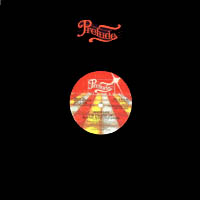 But it seems like everything that's good and funny has to end... And so did Disco, as some people would say - but not me!!!
But around '80 the "Disco sucks" campaign started. People were even burning Disco records at stakes, just like the old times
witch hunting. All of a sudden, you couldn't listen to, or dance to, Disco any longer. Or as
Marvin Schlachter, the owner of Prelude Records said about the
"death" of Disco in a 1980 Billboard interview; "The problem started with the companies which were late getting into the
Disco scene. When they woke up, they cut lots of Disco records and flooded the market."
But it seems like everything that's good and funny has to end... And so did Disco, as some people would say - but not me!!!
But around '80 the "Disco sucks" campaign started. People were even burning Disco records at stakes, just like the old times
witch hunting. All of a sudden, you couldn't listen to, or dance to, Disco any longer. Or as
Marvin Schlachter, the owner of Prelude Records said about the
"death" of Disco in a 1980 Billboard interview; "The problem started with the companies which were late getting into the
Disco scene. When they woke up, they cut lots of Disco records and flooded the market."
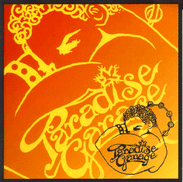 So, what happened was that the Disco scene returned to the clubs where it once started and with the new technical equipment's
like drum machines, synths and other things, the music transformed - from Disco - to Disco! Well, people preferred not to
call this "new" music Disco any longer. Even though I still think you could call it Disco, it was called things like
Garage - from the legendary N.Y.C. club Paradise Garage
where (the late) Larry Levan ruled, or House - from Chicago's
Warehouse where Frankie Knuckles were spinning the wheels of steel.
So, what happened was that the Disco scene returned to the clubs where it once started and with the new technical equipment's
like drum machines, synths and other things, the music transformed - from Disco - to Disco! Well, people preferred not to
call this "new" music Disco any longer. Even though I still think you could call it Disco, it was called things like
Garage - from the legendary N.Y.C. club Paradise Garage
where (the late) Larry Levan ruled, or House - from Chicago's
Warehouse where Frankie Knuckles were spinning the wheels of steel.
The more uptempo tunes were called Hi Energy (Hi-NRG) or Euro, since this kind of music was very
popular over in Europe at this time.
But the best name for all of these genres of previously called Disco music, is Dance music. It still had the same meaning
as it had when Disco started - It was designed for making people move and have fun to!
But - Disco would return. Especially during the late 1990's it came back in many ways. In sampling and covers and lots of
other ways...
It's hard to say if the Disco-House scene came out of the new remixes of classic Disco tracks that hit us in the late
80's or if it came out of sampling Disco tunes to go with new House tunes. I guess there could have been a combination
of both.
One of the first big hits using sampling was the Black Box's 1989 worldwide hit - "Ride on time" - which
was sampling the SalSoul Records diva Loleatta Holloway's
magnificent song "Love sensation" (this song was also sampled by Marky Mark in his 1991 "Good vibrations").
But the Black Box track was more of a House song than a Disco-House tune. But I guess the use of sampling like this
definitely opened up the eyes (and ears) for this new way of "recycle" music. And today more or less all dance music tunes
are using samples or else they are covers of classic Disco tunes.
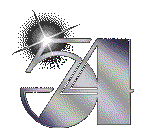 Most of the Disco-House tunes use samples, either instrumental parts, hooks or vocals, from classics and often
hard-to-find obscure Disco tracks. Other Disco-House tracks are just all brand new tracks created and inspired to sound
like a Disco classic.
Most of the Disco-House tunes use samples, either instrumental parts, hooks or vocals, from classics and often
hard-to-find obscure Disco tracks. Other Disco-House tracks are just all brand new tracks created and inspired to sound
like a Disco classic.
A perfect example of the later is the Pet Shop Boys' brilliant "New York city boy" with its clear
Village People influences. The 'Boys have also admitted that they wanted to create a song that sounded like a
Village People hit/Disco classic and the video is shot as if took place inside the legendary
Studio 54.
This was a brief introduction to the world of D-I-S-C-O, a world that really did contain so much great music and
so much fun. As everything it had its good sides and bad sides - but there have been nothing like this time.
This History could be pages and pages long, but I wanted to give you a basic view of the era - and now I suggest you look
around my site and start to EXPLORE the...
DISCO INFERNO
@
Disco-Disco.com
|






 Some people claims the Disco scene started already in the early 70's. Like in '71-'73. But I guess that really
depends on what you think is DISCO?! The Discotheque scene really started back then, with clubs starting playing
music on records to the audience. In these clubs, the Disc-Jockey [the DJ] was formed as this guy putting the records on the
turntables and often talking to the crowd in a radio show kind of way.
Some people claims the Disco scene started already in the early 70's. Like in '71-'73. But I guess that really
depends on what you think is DISCO?! The Discotheque scene really started back then, with clubs starting playing
music on records to the audience. In these clubs, the Disc-Jockey [the DJ] was formed as this guy putting the records on the
turntables and often talking to the crowd in a radio show kind of way. With the new format and the huge Disco explosion, special and exclusive mix versions were released on 12" DJ promotion
copies only. One of the most sought for (and hard to find) 12" promos, is the "Saturday Night Fever" 5-track promo, which
include Yvonne Elliman's "If I can't have you" and 4 Bee Gees tracks; "Stayin' alive", "Night
fever", "More than a woman" and "You should be dancing".
With the new format and the huge Disco explosion, special and exclusive mix versions were released on 12" DJ promotion
copies only. One of the most sought for (and hard to find) 12" promos, is the "Saturday Night Fever" 5-track promo, which
include Yvonne Elliman's "If I can't have you" and 4 Bee Gees tracks; "Stayin' alive", "Night
fever", "More than a woman" and "You should be dancing".
 But it wasn't just Disco that inspired movies, Disco was just as much influenced by other media's as they were of Disco.
You'll find Disco tunes based on different cartoon characters, like the Donald Duck voice in Rick Dees'
"Disco Duck", or all the songs released about Superman when that movie hit the silver screen.
But it wasn't just Disco that inspired movies, Disco was just as much influenced by other media's as they were of Disco.
You'll find Disco tunes based on different cartoon characters, like the Donald Duck voice in Rick Dees'
"Disco Duck", or all the songs released about Superman when that movie hit the silver screen.





 Most of the Disco-House tunes use samples, either instrumental parts, hooks or vocals, from classics and often
hard-to-find obscure Disco tracks. Other Disco-House tracks are just all brand new tracks created and inspired to sound
like a Disco classic.
Most of the Disco-House tunes use samples, either instrumental parts, hooks or vocals, from classics and often
hard-to-find obscure Disco tracks. Other Disco-House tracks are just all brand new tracks created and inspired to sound
like a Disco classic.